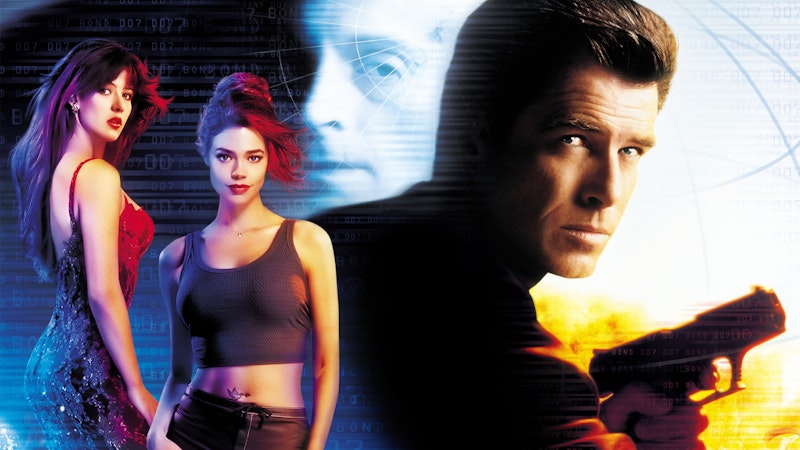Pierce Brosnan’s first two James Bond movies had a technothriller tone, a 1990s equivalent to the Bond films in the 1960s. Not science fiction, but movies that aimed at capturing the cool factor of bleeding-edge technology based on what the 1990s thought high-tech looked like. But individual Bond films exist on a continuum between stories all about that coolness and stories that try to capture a grittier tone. And Brosnan’s third movie chose to dial back the technology, for better or worse.
1999’s The World Is Not Enough begins with a clever if confusing extended pre-credit sequence in which Bond tracks down the killer of an MI6 agent, then sees a British oil tycoon murdered through booby-trapped cash, and then launches into a bravura boat chase along the Thames. Bond connects the money to a former KGB agent called Renard (Robert Carlyle), who’s unable to feel pain; MI6 boss M (Judi Dench) sends him to protect Renard’s probable next target, the tycoon’s daughter, Elektra King (Sophie Marceau), who now controls his company. During construction of a pipeline in Azerbaijan she’s attacked, and Bond chases a trail to Kazakhstan where he encounters Renard and nuclear physicist Doctor Christmas Jones (Denise Richards).
Jones allies with Bond, who fakes his death, and together they realize that Renard aims to sabotage an oil pipeline in to control the price of oil. Meanwhile, M’s kidnaped, and not too long after Bond’s captured by a surprise villain. This sets up a dramatic settling of accounts, and a final battle with Renard aboard a nuclear submarine.
There’s a twist I haven’t mentioned, but if you watch the movie you’ll pick it up well ahead of time. It’s to do with who among Elektra King’s retinue is working with Renard, and who the real mastermind is; and it’s not a bad idea, but it’s telegraphed to the point that Renard feels like a distraction from the main story, and Bond’s final battle with him is something of an afterthought.
If that plot point’s too clear too early, the movie otherwise errs in the other direction, having things happen well before explaining why. It’s not necessarily a bad choice, but unusual for a Bond picture, and it interferes with the rhythm of the action. Too often a set-piece starts with the aim of the characters unclear, alienating the audience from events. And then, as is often the case with a Bond plot, some things never make sense—in particular, Bond ends up haring off to Kazakhstan on very slender grounds.
Michael Apted directs this movie, and he brings a low-key feel to events. The movie’s not colorless, but does look more naturalistic than the other Brosnan films. That’s effective to a point, but doesn’t fit with a story involving hijacked nuclear subs and ex-KGB assassins. Still, it’s the first time in a while a sense of old-world richness exists in a Bond film to contrast with new technology; but then, there isn’t much technology here.
The script came from Neal Purvis and Robert Wade, with a rewrite by Bruce Feirstein, and since Purvis and Wade have worked on all the Bond films since, presumably their work went over well with the producers. It’s inconsistent on the screen, though. Much of the storyline revolves around Bond’s relationship with Elektra King, which has the potential for a strong dramatic arc, but the plotline’s filled with so many extraneous distractions that the drama’s diluted. It’s not good when the action feels like a diversion from what the film’s really about. Severe pacing issues around the middle of the film don’t help, either.
Pierce Brosnan sees what his character’s doing and tries to play the drama. The plot complications do him no favor, but he turns in a decent job, and this is significant because it means that when the plot gets too twisty at least the relationship of Bond and Elektra gives a viewer something to focus on. Sophie Marceau’s a help here; her Elektra is dynamic and aggressive, who has real chemistry with Brosnan’s Bond.
Unfortunately, Denise Richards isn’t particularly good in a role that’s jarringly out of place. The character’s introduced in a costume borrowed from Lara Croft, then never really finds much of a purpose beyond delivering exposition and giving Bond somebody to rescue. Renard, meanwhile, makes a good idea for a heavy, but he doesn’t come to life despite Robert Carlyle’s efforts.
Some of the supporting actors shine, though, notably Robbie Coltrane as a Russian gangster (returning from GoldenEye). John Cleese has a charming cameo as the apprentice and apparent successor to Desmond Llewelyn as Q—and it’s touching that Llewelyn, 84 when the movie opened and one of the few constants in the Bond movies back to the early-1960s, got something like a proper sendoff.
The irony is this is one of the Bond films relatively uninterested in gadgets and gizmos, turning away from the grand scale of previous adventures for a more human-level story. Yet, as always happens when Bond movies try to tell such stories, it runs afoul of the Bond conventions. The action ends up too big for the character issues to breathe, while still being small compared with earlier Bond films.
The World Is Not Enough is an odd, inconsistent movie. It has a number of good ideas about character motivation and plot structure, but they don’t cohere because the makers don’t grasp how to exploit them or what the strengths of the movie are. It’s not visually impressive, and if some of the action sequences are effective it also slows down at odd moments. It’s not especially good.

